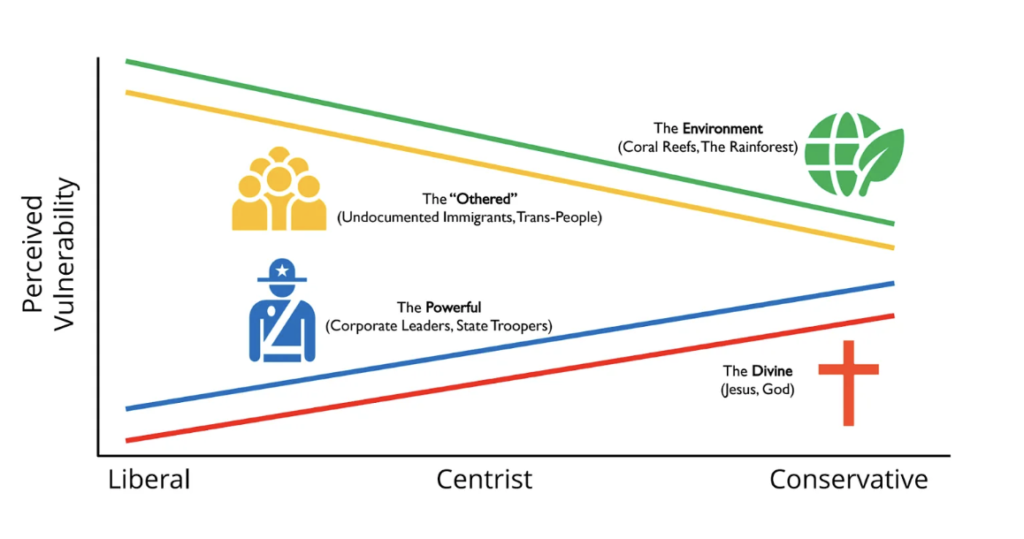Assumptions of Vulnerability
We’ve analyzed your moral outlook on the world based on your Assumptions of Vulnerability (AoVs)—how much different targets seem especially vulnerable to victimization. The more vulnerable you perceive these targets, the more important you think it is to protect them from harm, and the more blame people deserve for mistreating them.
The 4 AoV Clusters
Four clusters of targets help make sense of political disagreement about hot-button issues. They are the Environment, the Othered, the Powerful, and the Divine.
The Environment
This cluster focuses on how vulnerable natural ecosystems seem to harm. Examples include rainforests, coral reefs, and planet Earth itself. While many agree on the vulnerability of specific species (like polar bears), people disagree about the risks to complex systems from human actions. These differences help explain gaps in support for climate change policies and oil drilling.
The Othered
This cluster captures the vulnerability of groups outside the traditional center of American society. While liberals and conservatives may disagree on who counts as “marginalized,” both acknowledge that groups like undocumented immigrants, transgender people, and Muslims all exist outside the societal center. Different perceptions about the vulnerability of these groups shape debates over immigration policies and trans rights.
The Powerful
This cluster looks at whether those in positions of authority—like corporate leaders, police officers, and troopers—are vulnerable to harm. Most people see them as less likely victims than marginalized people, but political divides still arise from this cluster. Conservatives often see the powerful as worthy of protection–and also crucial for maintaining order (e.g., Blue Lives Matter)–while liberals can see members of these groups as invulnerable and targets of animosity (e.g., “eat the rich”).
The Divine
This cluster centers on whether religious entities, like God, Jesus, or the Bible, are vulnerable to harm. These beliefs drive disagreements about religious respect, such as whether burning a Bible is acceptable, and whether sin hurts God. Christianity’s central role in American politics makes this a particularly charged cluster.
Your Personal AoV Profile
What Your AoV Profile Suggests About Your Politics:
How to Use AoVs in Conversations
Our moral judgments revolve around concerns about harm, but people with different political perspectives often emphasize different harms. Our research shows that AoVs follow consistent patterns across political parties. Committed liberals amplify differences in vulnerability, splitting the world into the very vulnerable (the oppressed) and the very invulnerable (oppressors). Committed conservatives dampen differences in vulnerability, seeing all people as relatively similar in their vulnerability, believing that no matter their identities all people can be both victims and victimizers. We’re all motivated to protect the vulnerable, but get caught up in disagreements about the real identity of victims (and potential victims). When talking with someone who disagrees with you on these hot-button issues, you can use these clusters to explain your perspective and to understand why someone might prioritize different causes than your own.

For personalized help, check out the CIVil Conversation AI Assistant on this site. It can help give personalized advice for navigating real-world conversations, including how to best share your AoVs.



